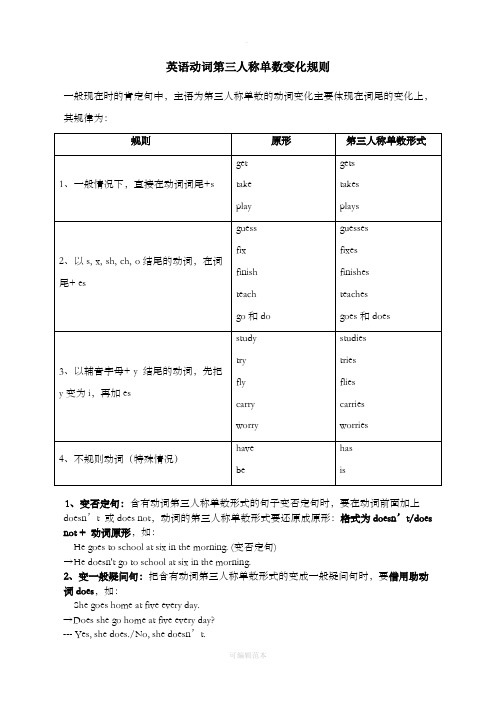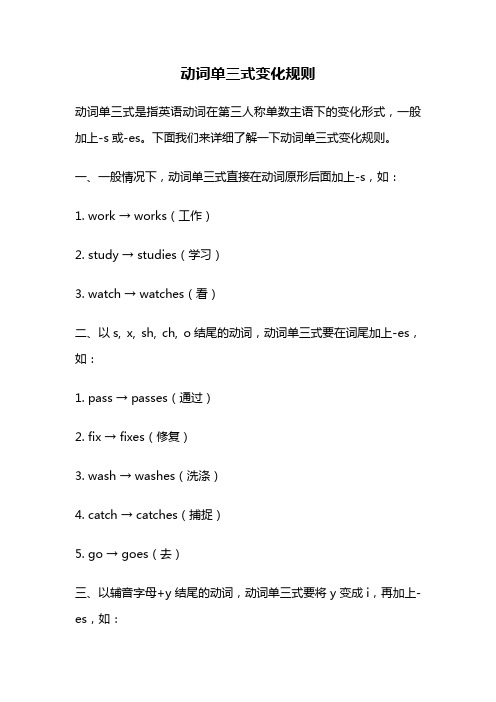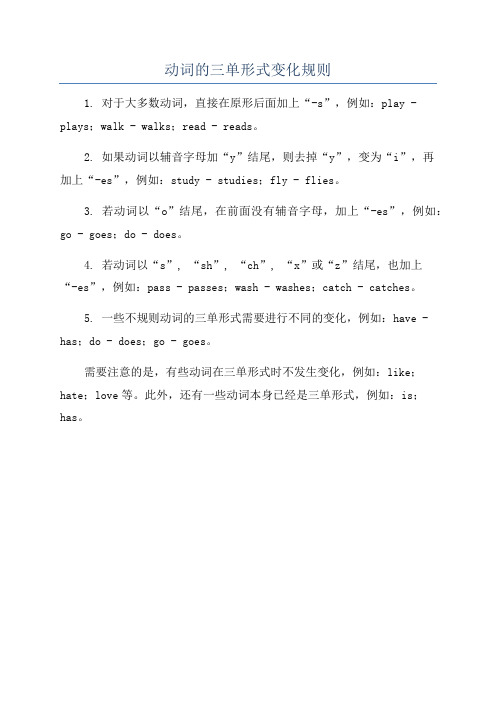英语动词第三人称单数变化规则
英语动词《第三人称单数形式》的变化规则15435

英语动词第三人称单数变化规则一般现在时的肯定句中,主语为第三人称单数的动词变化主要体现在词尾的变化上,其规律为:1、变否定句:含有动词第三人称单数形式的句子变否定句时,要在动词前面加上doesn’t 或does not,动词的第三人称单数形式要还原成原形:格式为doesn’t/does not + 动词原形,如:He goes to school at six in the morning. (变否定句)→He doesn't go to school at six in the morning.2、变一般疑问句:把含有动词第三人称单数形式的变成一般疑问句时,要借用助动词does,如:She goes home at five every day.→Does she go home at five every day?--- Yes, she does./No, she doesn’t.哪些主语是第三人称单数?1、人称代词he, she, it;如:He likes watching TV. 他喜欢看电视。
She has lunch at twelve. 她十二点吃午餐。
It looks like a cat. 它看起来像只猫。
2、单个人名、地名或称呼作主语;是第三人称单数。
如:Han Mei looks like her mother. 韩梅看起来像她的母亲。
Beijing is in China. 北京在中国。
Uncle Wang often makes cakes. 王叔叔经常做蛋糕。
3、单数可数名词或this / that / the + 单数可数名词作主语时,是第三人称单数;A horse is a useful animal. 马是有用的动物。
This book is yours. 这本书是你的。
That car is red. 那辆小汽车是红色的。
The cat is Lucy's. 只猫是露茜的。
英语动词第三人称单数变化规则

英语动词第三人称单数变化规则一般现在时的肯定句中,主语为第三人称单数的动词变化主要体现在词尾的变化上,其规律为:规则原形第三人称单数形式 1、一般情况下,直接在动词词尾+s如:get take play gets takes plays2、以s, x, sh, ch, o结尾的动词,在词尾+ esguess fix finish teach go和do guesses fixes finishes teaches goes和does3、以辅音字母+ y 结尾的动词,先把y变为i,再加esstudy try fly carry worrystudies tries flies carries worries4、不规则动词(特殊情况)have behas is1、变否定句:含有动词第三人称单数形式的句子变否定句时,要在动词前面加上doesn’t 或does not,动词的第三人称单数形式要还原成原形:格式为doesn’t/does not + 动词原形,如:He goes to school at six in the morning. (变否定句) →He doesn't go to school at six in the morning.2、变一般疑问句:把含有动词第三人称单数形式的变成一般疑问句时,要借用助动词does,如:She goes home at five every day. →Does she go home at five every day? --- Yes, she does./No, she doesn’t.哪些主语是第三人称单数? 1、人称代词he, she, it;如:He likes watching TV. 他喜欢看电视。
She has lunch at twelve. 她十二点吃午餐。
It looks like a cat. 它看起来像只猫。
2、单个人名、地名或称呼作主语;是第三人称单数。
(知识点)理解动词的第三人称单数形式的变化规则

(知识点)理解动词的第三人称单数形式的变化规则在英语的动词变化中,第三人称单数形式是一个重要的知识点。
正确掌握动词的第三人称单数形式的变化规则,将有助于我们准确地使用英语语法。
本文将详细介绍动词第三人称单数形式的变化规则,并给出一些例子来帮助读者更好地理解。
一、动词第三人称单数形式变化规则在大多数情况下,动词的第三人称单数形式直接在原词的基础上加上“-s”或“-es”。
具体的规则如下:1. 对于以辅音字母加“y”结尾的动词,将“y”变为“i”,再加上“-es”;例如:- study(学习)→ he studies(他学习)- fly(飞)→ she flies(她飞)2. 对于以“o”结尾的动词,加上“-es”;例如:- go(去)→ he goes(他去)- do(做)→ she does(她做)3. 对于以“s”、“x”、“ch”、“sh”等音结尾的动词,直接在词尾加上“-es”;例如:- watch(观看)→ he watches(他观看)- kiss(亲吻)→ she kisses(她亲吻)4. 对于大多数动词,直接在词尾加上“-s”;例如:- work(工作)→ he works(他工作)- play(玩耍)→ she plays(她玩耍)需要注意的是,还有一些特殊的动词需要特殊处理。
比如,有一些动词的第三人称单数形式并不在词尾加“-s”或“-es”,而是通过其他方式变化。
例如:1. be(是)→ is(是)例如:- I am(我是)→ he is(他是)2. have(有)→ has(有)例如:- I have(我有)→ she h as(她有)3. do(做)→ does(做)例如:- I do(我做)→ he does(他做)二、动词第三人称单数形式变化的例子为了更好地理解动词第三人称单数形式的变化规则,以下是一些例子:1. work(工作)- I work(我工作)- he works(他工作)2. study(学习)- she studies(她学习)- they study(他们学习)3. play(玩耍)- he plays(他玩耍)- she plays(她玩耍)4. go(去)- I go(我去)- he goes(他去)5. watch(观看)- she watches(她观看)- they watch(他们观看)通过以上例子,我们可以清楚地看到动词的第三人称单数形式是如何变化的。
第三人称单数变化规则

英语动词《第三人称单数形式》的变化规则

英语动词第三人称单数变化规则一般现在时的肯定句中,主语为第三人称单数的动词变化主要体现在词尾的变化上,其规律为:1、变否定句:含有动词第三人称单数形式的句子变否定句时,要在动词前面加上doesn’t 或does not,动词的第三人称单数形式要还原成原形:格式为doesn’t/does not + 动词原形,如:He goes to school at six in the morning. (变否定句)→He doesn't go to school at six in the morning.2、变一般疑问句:把含有动词第三人称单数形式的变成一般疑问句时,要借用助动词does,如:She goes home at five every day.→Does she go home at five every day?--- Yes, she does./No, she doesn’t.哪些主语是第三人称单数?1、人称代词he, she, it;如:He likes watching TV. 他喜欢看电视。
She has lunch at twelve. 她十二点吃午餐。
It looks like a cat. 它看起来像只猫。
2、单个人名、地名或称呼作主语;是第三人称单数。
如:Han Mei looks like her mother. 韩梅看起来像她的母亲。
Beijing is in China. 北京在中国。
Uncle Wang often makes cakes. 王叔叔经常做蛋糕。
3、单数可数名词或this / that / the + 单数可数名词作主语时,是第三人称单数;A horse is a useful animal. 马是有用的动物。
This book is yours. 这本书是你的。
That car is red. 那辆小汽车是红色的。
The cat is Lucy's. 只猫是露茜的。
动词单三式变化规则

动词单三式变化规则
动词单三式是指英语动词在第三人称单数主语下的变化形式,一般加上-s或-es。
下面我们来详细了解一下动词单三式变化规则。
一、一般情况下,动词单三式直接在动词原形后面加上-s,如:
1. work → works(工作)
2. study → studies(学习)
3. watch → watches(看)
二、以s, x, sh, ch, o结尾的动词,动词单三式要在词尾加上-es,如:
1. pass → passes(通过)
2. fix → fixes(修复)
3. wash → washes(洗涤)
4. catch → catches(捕捉)
5. go → goes(去)
三、以辅音字母+y结尾的动词,动词单三式要将y变成i,再加上-es,如:
1. study → studies(学习)
2. fly → flies(飞行)
3. try → tries(尝试)
四、以元音字母+y结尾的动词,动词单三式直接加上-s,如:
1. play → plays(玩)
2. enjoy → enjoys(享受)
五、以“辅音字母+e”结尾的动词,动词单三式直接加上-s,如:
1. love → loves(爱)
2. dance → dances(跳舞)
六、部分动词的单三式变化规则:
1. have → has(有)
2. be → is(是)
3. do → does(做)
以上是动词单三式变化规则的详细介绍,掌握这些规则,可以帮助我们更加准确地使用英语动词。
同时,我们也需要注意的是,有些
动词的单三式变化不遵循以上规则,需要我们根据实际情况进行记忆和掌握。
动词的三单形式变化规则

动词的三单形式变化规则
1. 对于大多数动词,直接在原形后面加上“-s”,例如:play - plays;walk - walks;read - reads。
2. 如果动词以辅音字母加“y”结尾,则去掉“y”,变为“i”,再
加上“-es”,例如:study - studies;fly - flies。
3. 若动词以“o”结尾,在前面没有辅音字母,加上“-es”,例如:go - goes;do - does。
4. 若动词以“s”, “sh”, “ch”, “x”或“z”结尾,也加上
“-es”,例如:pass - passes;wash - washes;catch - catches。
5. 一些不规则动词的三单形式需要进行不同的变化,例如:have - has;do - does;go - goes。
需要注意的是,有些动词在三单形式时不发生变化,例如:like;hate;love等。
此外,还有一些动词本身已经是三单形式,例如:is;has。
英语动词第三人称单数形式的变化规则

英语动词第三人称单数改变规则通常现在时肯定句中,主语为第三人称单数动词改变关键表现在词尾改变上,其规律为:1、变否定句:含有动词第三人称单数形式句子变否定句时,要在动词前面加上doesn’t 或does not,动词第三人称单数形式要还原成原形:格式为doesn’t/does not + 动词原形,如:He goes to school at six in the morning. (变否定句)→He doesn't go to school at six in the morning.2、变通常疑问句:把含有动词第三人称单数形式变成通常疑问句时,要借用助动词does,如:She goes home at five every day.→Does she go home at five every day?--- Yes, she does./No, she doesn’t.3、对划线部分进行提问(变特殊疑问句):通常格式为Whxxx + 通常疑问句?She goes home at five every day. (对划线部分提问)→When/What time does she go home every day?She goes home at five every day. (对划线部分提问)→Who goes home at five every day?She goes home at five every day. (对划线部分提问)→What does she do at five every day?哪些主语是第三人称单数?1、人称代词he, she, it;如:He likes watching TV. 她喜爱看电视。
She has lunch at twelve. 她十二点吃午餐。
It looks like a cat. 它看起来像只猫。
2、单个人名、地名或称呼作主语;是第三人称单数。
- 1、下载文档前请自行甄别文档内容的完整性,平台不提供额外的编辑、内容补充、找答案等附加服务。
- 2、"仅部分预览"的文档,不可在线预览部分如存在完整性等问题,可反馈申请退款(可完整预览的文档不适用该条件!)。
- 3、如文档侵犯您的权益,请联系客服反馈,我们会尽快为您处理(人工客服工作时间:9:00-18:30)。
英语动词第三人称单数变化规则
一般现在时的肯定句中,主语为第三人称单数的动词变化主要体现在词尾的变化上,其规律为:
规则
原形
第三人称单数形式 1、一般情况下,直接在动词词尾+s
如:get take play gets takes plays
2、以s, x, sh, ch, o结尾的动词,在词尾+ es
guess fix finish teach go和do guesses fixes finishes teaches goes和does
3、以辅音字母+ y 结尾的动词,先把y变为i,再加es
study try fly carry worry
studies tries flies carries worries
4、不规则动词(特殊情况)
have behas is
1、变否定句:含有动词第三人称单数形式的句子变否定句时,要在动词前面加上doesn’t 或does not,动词的第三人称单数形式要还原成原形:格式为doesn’t/does not + 动词原形,如: He goes to school at six in the morning. (变否定句)→He doesn’t go to school at six in the morning。
2、变一般疑问句:把含有动词第三人称单数形式的变成一般疑问句时,要借用助动词does,如:
She goes home at five every day。
→Does she go home at five every day?—-- Yes, she does。
/No, she doesn’t。
哪些主语是第三人称单数? 1、人称代词he, she, it;
如:He likes watching TV. 他喜欢看电视。
She has lunch at twelve。
她十二点吃午餐. It looks like a cat。
它看起来像只猫.
2、单个人名、地名或称呼作主语;是第三人称单数.如:
Han Mei looks like her mother. 韩梅看起来像她的母亲。
Beijing is in China。
北京在中国。
Uncle Wang often makes cakes。
王叔叔经常做蛋糕。
3、单数可数名词或this / that / the + 单数可数名词作主语时,是第三人称单数;
A horse is a useful animal。
马是有用的动物。
This book is yours。
这本书是你的。
That car is red。
那辆小汽车是红色的。
The cat is Lucy's. 只猫是露茜的。
4、不可数名词作主语时为第三人称单数。
如: The milk is in the glass。
牛奶在玻璃杯里。
The bread is very small. 那面包很小。
The water is very cold。
那些水很凉. 。
例题引路:
1、写出下列动词的第三人称单数.
drink ________ go _______ stay ________ make ________ look _________ have_______ pass_______ carry _______ come________ watch________ plant_______ fly ________ study_______ brush________ teach________ 2、用括号内动词的适当形式填空.
1. He often ________(have) dinner at home。
2. We _____________ (not watch) TV on Monday.
3. Nick ___________ (not go) to the zoo on Sunday. 4。
________ they __________ (like) the World Cup?
5. What _________they often _________ (do) on Saturdays?
6。
_________ your parents _________ (read) newspapers every day? 7. There ________(be) so me water in the bottle. 8. My aunt _______(look) after her baby carefully。
9. The child often _ ______(watch) TV in the evening.
10. Mike's sister ________ (cook) nice food。
I _______ (like) eating it very much.
21。
_______ (do) your brother_______ (watch) TV in the evening? No, he_______ (not)。
3、选出正确的答案:
1。
She (like / likes) to play football。
2. He (like / likes) drinking milk。
3。
I (like / likes) to watch TV。
4. We (like / likes) to play badminton.
5。
They (like / likes) to sing songs.
6. She (read / reads) books every day.
7。
He (play / plays) computer games every day。
8。
It (listen / listens) to the radio every day.
9。
Linda (draw / draws) pictures every day。
10。
Jane and Linda (play / plays) football every day。
5、把下列句子变为否定句:
1. We like playing football。
2. Linda swims every day.
3. They like playing games。
4。
My father reads newspaper in the evening.
7、把下列句子变为疑问句,并做肯定和否定回答。
1.My brother can ride a horse.
2. 4。
We clean the classroom after school.
___________________________________________________________。
